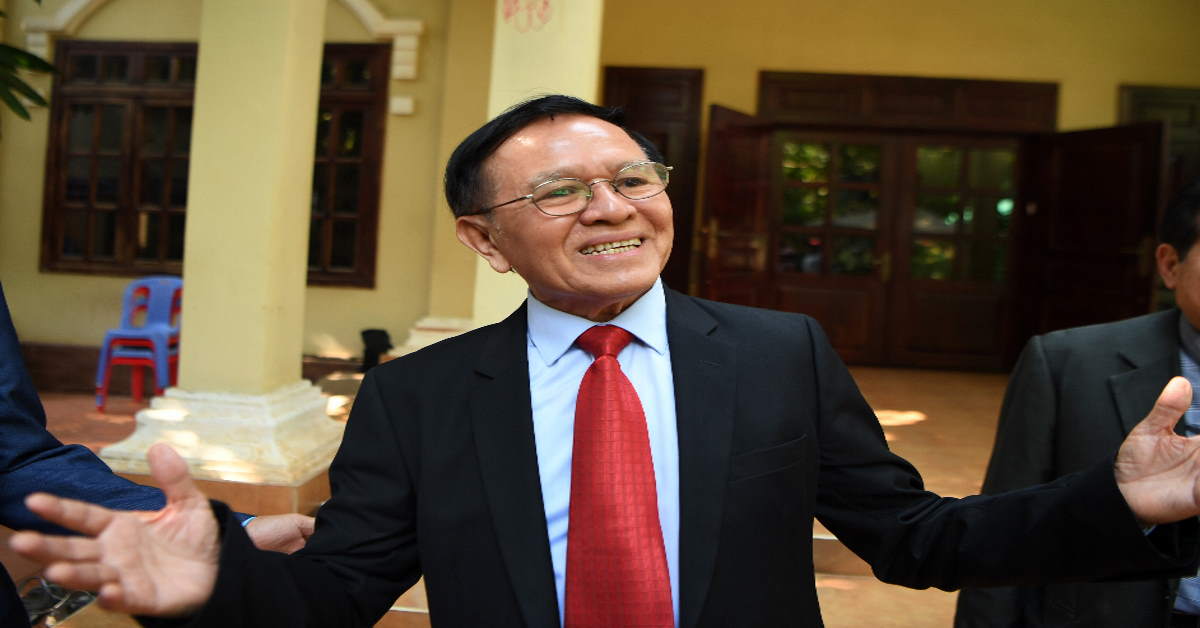Sam Rainsy
18 January 2020
Asian Post

Kem Sokha, former leader of the now-banned Cambodia National Rescue Party (CNRP), speaks to media as he departs his residence for the Phnom Penh municipal court for his trial on 15 January, 2020. (AFP Photo)
The sham trial of Kem Sokha, the leader of the Cambodia National Rescue Party (CNRP), is underway in Phnom Penh. How the international community responds will send a powerful signal to Hun Sen, the world’s longest-serving prime minister, about his ability to continue to trample on Cambodia’s democracy and its people’s human rights.
After Kem Sokha and I founded the CNRP, Cambodia’s first united democratic opposition party, in 2012, we quickly gained strong public support. In both, the 2013 general election and the 2017 communal elections, the CNRP won nearly half the vote, despite systematic structural bias in favour of the ruling Cambodian People’s Party (CPP).
Terrified by the obvious threat the CNRP posed to his rule, Hun Sen sought a pretext to crush us. So, in 2017, when I was still the CNRP’s leader, he proposed an amendment that would bar “convicted criminals” from leading a political party – a clear bid to use the string of politically motivated convictions on my record to discredit the CNRP. To prevent him from succeeding, I resigned as CNRP leader in February 2017, leaving Kem Sokha, with his clean record, in charge.
That didn’t stop Hun Sen. Seven months after my resignation, his government simply fabricated treason charges against Kem Sokha. Within two months, the CNRP was dissolved by a judiciary loyal to Hun Sen. (In both 2018 and 2019, Cambodia ranked second to last in the World Justice Project’s Rule of Law Index.) The fact that a two-year investigation into Kem Sokha hasn’t produced a shred of evidence against him is, apparently, irrelevant.
But Hun Sen knows that a party is more than its official status; it is its people. So instead of, say, addressing the abject poverty in which a huge share of Cambodians live, he has channelled his energy and the government’s resources toward keeping Kem Sokha and me apart and pressuring CNRP supporters to defect.
Today, Kem Sokha is forbidden from leaving the country, and I am barred from entering it. When I last tried to do so in November, Hun Sen issued a directive prohibiting commercial airlines that serve Cambodia from allowing me to board, and threatening “serious consequences” for anyone that defied the ban. Moreover, he convinced Thailand to prevent me from flying into Bangkok, in order to stop me from crossing into Cambodia by land.
Hun Sen’s desperation to keep me out of Cambodia betrays the weakness of his position. I have challenged him many times to try me instead of Kem Sokha, but he fears the national and international response to my arrest and trial as much as he fears the support I would receive if he allowed me to move freely in Cambodia. More than 90 percent of the 5,007 CNRP local councillors elected in 2017 relinquished their positions, rather than defect to the CPP. Likewise, over 90 percent of the 118 leading CNRP figures whom Hun Sen’s regime banned from politics have refused to trade their political allegiance for the reinstatement of their political rights.
Ordinary CNRP supporters – who comprise nearly half of Cambodia’s population – also remain loyal, despite the threat of violent harassment, arrest, or forced exile. In the 2018 national election, they refused to endorse any of the CPP-approved “opposition” parties. They were not about to let the CPP pretend that the national assembly – filled exclusively with CPP members – was in any way fair or representative.
Like that bogus election, Kem Sokha’s sham trial will go ahead. He will most likely be found guilty, and then be granted a royal pardon by King Norodom Sihamoni, at Hun Sen’s request. The pardon is critical to avoid any appeal or, worse, acquittal – an outcome that would expose the government’s deceit and force it to reinstate the CNRP. Releasing a pardoned Kem Sokha, by contrast, would support the narrative that Hun Sen’s government was right about him and the CNRP.
There can be no democracy without a credible opposition, and in today’s Cambodia, there can be no credible opposition without the CNRP. Releasing Kem Sokha with a record marred by politically motivated lies that provide a pretext for maintaining the ban on the CNRP would not only fail to advance democracy; it would accelerate Cambodia’s descent into authoritarianism.
The world’s democracies must not fall for Hun Sen’s charade. The European Union (EU) is considering withdrawal of tariff-free access for Cambodian exports. Others, too, must make it clear that Cambodia will face consequences unless the authorities promptly drop all charges against Kem Sokha, reinstitute the CNRP under his leadership, and hold free and fair elections. Democracy demands nothing less.
Sam Rainsy is the acting president of the Cambodia National Rescue Party.

1 comment:
Don't worry: the destination to hell under Ah Lngi Lngeu Hun Sen's leadership will be reached soon !!
It is about time that Khmer people wake up and put up some fight - by peaceful and legal means - against this Yuon's puppet Hun Sen.
So far, Ah Roleuy Hun Sen has given in to all Yuon's demands in exchange for his power.
Post a Comment